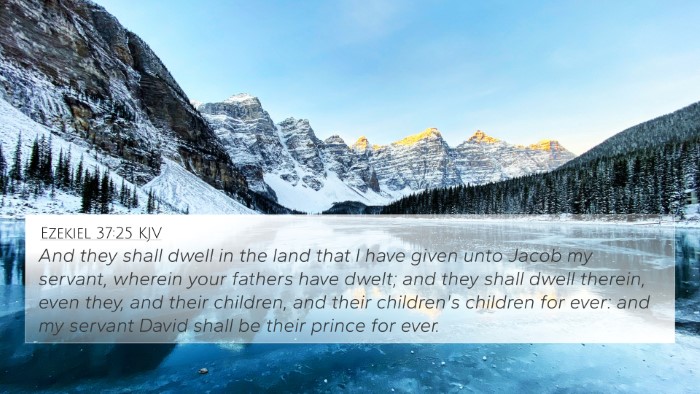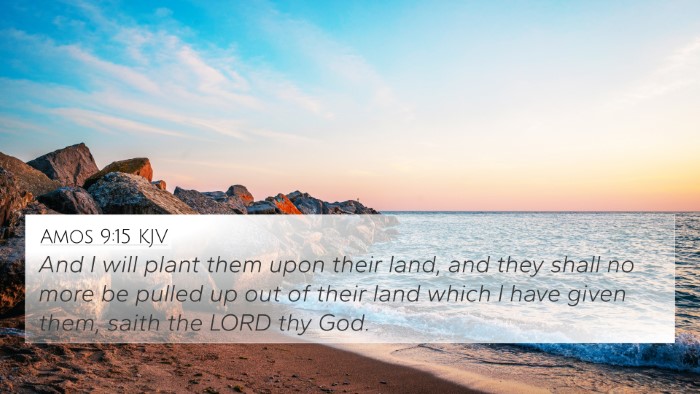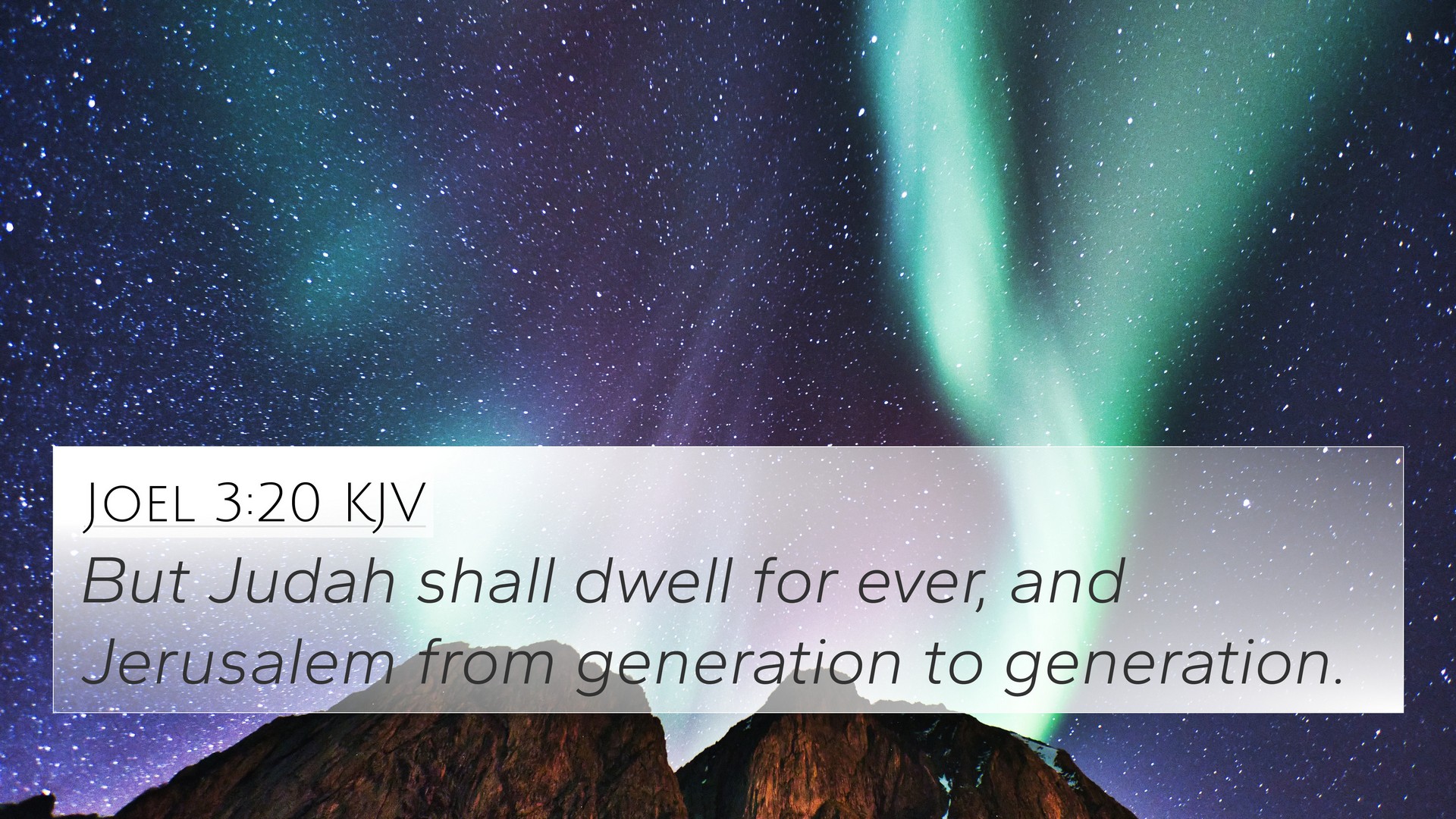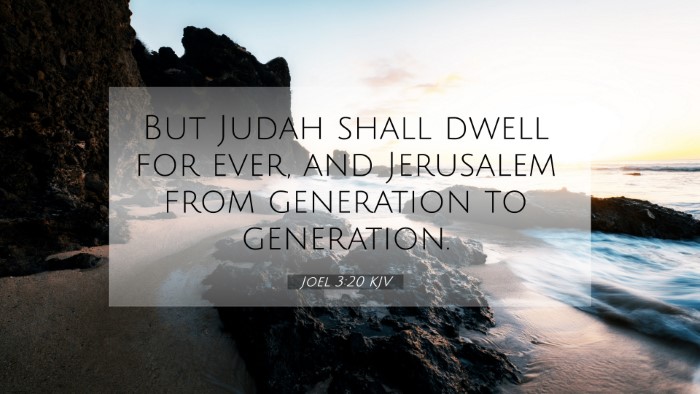Old Testament
Genesis Exodus Leviticus Numbers Deuteronomy Joshua Judges Ruth 1 Samuel 2 Samuel 1 Kings 2 Kings 1 Chronicles 2 Chronicles Ezra Nehemiah Esther Job Psalms Proverbs Ecclesiastes Song of Solomon Isaiah Jeremiah Lamentations Ezekiel Daniel Hosea Joel Amos Obadiah Jonah Micah Nahum Habakkuk Zephaniah Haggai Zechariah MalachiJoel 3:20 Similar Verses
Joel 3:20 Cross References
But Judah shall dwell for ever, and Jerusalem from generation to generation.
Uncover the Rich Themes and Topics of This Bible Verse
Listed below are the Bible themes associated with Joel 3:20. We invite you to explore each theme to gain deeper insights into the Scriptures.
Joel 3:20 Cross Reference Verses
This section features a detailed cross-reference designed to enrich your understanding of the Scriptures. Below, you will find carefully selected verses that echo the themes and teachings related to Joel 3:20 KJV. Click on any image to explore detailed analyses of related Bible verses and uncover deeper theological insights.

Ezekiel 37:25 (KJV) »
And they shall dwell in the land that I have given unto Jacob my servant, wherein your fathers have dwelt; and they shall dwell therein, even they, and their children, and their children's children for ever: and my servant David shall be their prince for ever.

Amos 9:15 (KJV) »
And I will plant them upon their land, and they shall no more be pulled up out of their land which I have given them, saith the LORD thy God.

Isaiah 33:20 (KJV) »
Look upon Zion, the city of our solemnities: thine eyes shall see Jerusalem a quiet habitation, a tabernacle that shall not be taken down; not one of the stakes thereof shall ever be removed, neither shall any of the cords thereof be broken.
Joel 3:20 Verse Analysis and Similar Verses
Understanding Joel 3:20
Joel 3:20 states, "But Judah shall dwell forever, and Jerusalem from generation to generation." This verse signifies the enduring promise of God towards His people, emphasizing the divine assurance that His people will be preserved.
Summary of Insights from Public Domain Commentaries
-
Matthew Henry's Commentary:
Henry explains that this verse conveys God's intention for the restoration and permanence of Jerusalem. It denotes a future where the land is secure, and its inhabitants will dwell in peace, reflecting God's covenant faithfulness.
-
Albert Barnes' Notes:
Barnes highlights that “Judah” and “Jerusalem” symbolize not just a physical location but also the spiritual state of God’s people. The everlasting aspect indicates the unbreakable relationship between God and His covenant community, providing hope amidst adversity.
-
Adam Clarke's Commentary:
Clarke notes that the phrase “from generation to generation” stresses the idea of continuity. It suggests that God's promise is not limited to a single generation but extends through time, preserving His people across ages.
Thematic Connections to Other Bible Verses
Joel 3:20 has deep thematic connections to several other scriptures, illustrating God’s fidelity and the everlasting nature of His covenant with His people. The following verses provide a rich context:
-
Isaiah 65:17: "For behold, I create new heavens and a new earth; and the former shall not be remembered or come to mind."
This verse echoes the theme of restoration and a new beginning for God’s people.
-
Psalm 125:1-2: "Those who trust in the Lord are like Mount Zion, which cannot be moved but abides forever."
This highlights the unwavering nature of God’s protection over His people.
-
Revelation 21:2-3: "And I, John, saw the holy city, new Jerusalem, coming down from God out of heaven, prepared as a bride adorned for her husband."
Reflects the future hope for believers, tying back to the promise of Jerusalem's permanence.
-
Jeremiah 31:35-37: "Thus says the Lord, who gives the sun for a light by day... If those ordinances depart from before me, then the seed of Israel also shall cease from being a nation before me forever."
This reinforces the commitment God has towards Israel’s eternal status.
-
Romans 11:1-2: "I say then, has God cast away His people? Certainly not! For I also am an Israelite, of the seed of Abraham..."
Affirms that God’s promises to Israel are still active and enduring.
-
Micah 4:7: "And I will make the lame a remnant, and the outcast a strong nation; so the Lord will reign over them in Mount Zion from now on, even forever."
This verse emphasizes God’s sovereignty and the enduring nature of His people.
-
Matthew 5:5: "Blessed are the meek, for they shall inherit the earth."
This connects with the theme of God's chosen people receiving the promised land and its eternal significance.
Cross-Referencing Biblical Texts
Understanding Joel 3:20 can be enhanced through cross-referencing related biblical texts:
- Deuteronomy 30:3-5: Indicates God's promise of restoration and brings new hope for His people.
- Hebrews 13:14: "For here we have no continuing city, but we seek the one to come." This reflects the eternal nature of the city promised by God.
- Galatians 3:29: "And if you are Christ’s, then you are Abraham’s seed, and heirs according to the promise." This connects the New Testament believers to God’s eternal plan.
Tools for Bible Cross-Referencing
For those looking to delve deeper into the themes and connections of various Bible verses, utilizing a Bible concordance or a cross-reference Bible study guide can be incredibly helpful. Here are some tools and methods:
- Bible reference resources: Utilize resources that allow for seamless navigation between connected verses.
- Bible cross-reference system: Familiarize yourself with different Bible versions that offer cross-references in the margins.
- Cross-referencing Bible study methods: Engage in thematic studies that connect verses across both Testaments.
Conclusion
Joel 3:20 serves as a beautiful reminder of God's unbreakable covenant with His people. By exploring the verse through the lens of public domain commentaries and cross-referencing with other biblical texts, we can gain a deeper understanding of the rich implications this verse holds for believers today. These insights highlight the continuity of God's promise through generations and the thematic connections between different scriptures, reaffirming the importance of cross-referencing in biblical studies.


